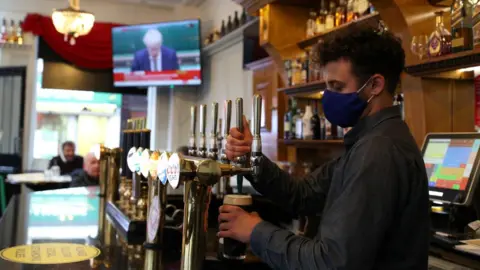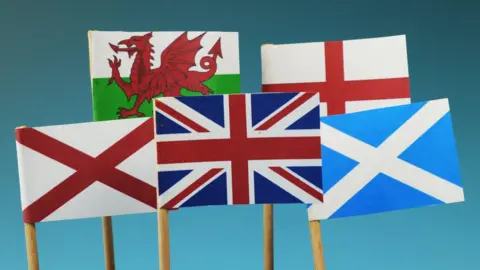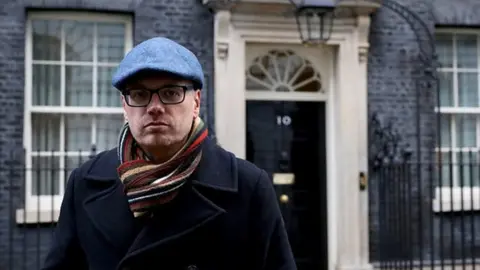Covid: Has devolution helped or hampered coronavirus response?
 Getty Images
Getty ImagesEarlier this month, Wales' First Minister Mark Drakeford announced that people from Covid hot-spots in the UK were banned from crossing the border into Wales.
It was an intervention that illustrated just how much the coronavirus pandemic has emboldened the UK's devolved administrations to make decisions which significantly diverge from those in Downing Street.
On Friday, Wales went into a national "firebreak" lockdown which has seen pubs, bars, restaurants, gyms and all non-essential shops close until 9 November.
Meanwhile, Scotland has announced that it will move to a new five-tier system of coronavirus restrictions from Monday, and Northern Ireland is in the middle of four weeks of tighter restrictions.
Every area of England is now in one of three categories, medium (tier one), high (tier two) or very high (tier three), depending on the local infection rate.
Amid all these different approaches, there have been calls for unity between the UK's central and devolved governments on issues ranging from business support to Christmas restrictions.
But what's behind the differences? Are they confusing people? And what do they tell us about devolution?
Following the science?
 PA Media
PA MediaThe Welsh Government says its decision to impose a 17-day national lockdown was based on scientific advice provided to all governments in the UK.
However, this move was opposed by some opposition parties in the Senedd.
The Welsh Government's Technical Advisory Cell (TAC) is consistent with the recommendations from the Scientific Advisory Group for Emergencies (Sage), available to all four UK administrations.
Back in September, Sage advisers called for the immediate introduction of a short national lockdown, including:
- Banning all contact inside homes with members of other households
- Closing all bars, restaurants, cafes, indoor gyms and hairdressers
- Requiring all university and college teaching to take place online
The UK government, in deciding against a national lockdown in England, said it had taken "balanced judgements" that weighed up the effect on the economy and "all the other unintended consequences" of measures, such as the impact on mental health and delayed surgeries.
In essence, governments can legitimately hold different views on how to deal with a problem.
But where does that leave prospects of co-operation?
'Very immature system'

"This is a public health crisis - a pandemic - which does not have any respect for borders," said Prof Laura McAllister, of Cardiff University's Wales Governance Centre.
"But you have to contextualise that. If it were feasible, we would have a global or European response to Covid rather than a UK response, never mind individual responses by the UK devolved nations."
Part of the problem, Prof McAllister said, was simply the difficulty of achieving unified action between two distinct political entities.
But she said "a very immature system of inter-governmental relations" in the UK had made co-ordination all the more difficult.
"The reality is that if there were effective inter-governmental liaisons, it would have been quite possible for agreement to be reached on employment support, lockdown measures, but I don't think you can blame the devolved governments for that."
Has a lack of co-ordination led to confusion?
 Getty Images
Getty ImagesThere have been claims, including by UK Transport Secretary Grant Shapps, that differences in restrictions within the UK causes confusion.
But even if that assessment is true, it begs the question: Who should fall in line with whose restrictions?
Prof McAllister said the idea there was widespread confusion about the rules had been "overplayed", especially by the media.
"There has probably been a bit of confusion, but we are in the middle of a pandemic so it would be a bit odd if there wasn't.
"The confusion is that people in England didn't even realise Wales had the powers it did - some people in Wales were probably equally surprised. People are being told they are confused - but they know the policies in Wales."
'Divisions brought into the open'

The pandemic has become a "proxy" for wider debates about devolution and the future of the UK, according to a historian at Swansea University.
Prof Martin Johnes has written extensively on Welsh national identity and presented a BBC documentary looking at Wales' relationship with England.
He said: "It's difficult not to conclude that those who support greater uniformity in Covid policy are motivated not just by the needs of fighting the pandemic, but also their discomfort over the principle of the different UK nations being able to do things differently.
"Similarly, those who support Wales and Scotland going their own way often appear to be thinking as much about upholding the principle of devolution as they are about health needs.
"Because it's not clear what should be done, it's very easy to be also influenced by wider thinking and feelings around devolution and national identity. These divisions were always there but Covid has brought them out into the open."
